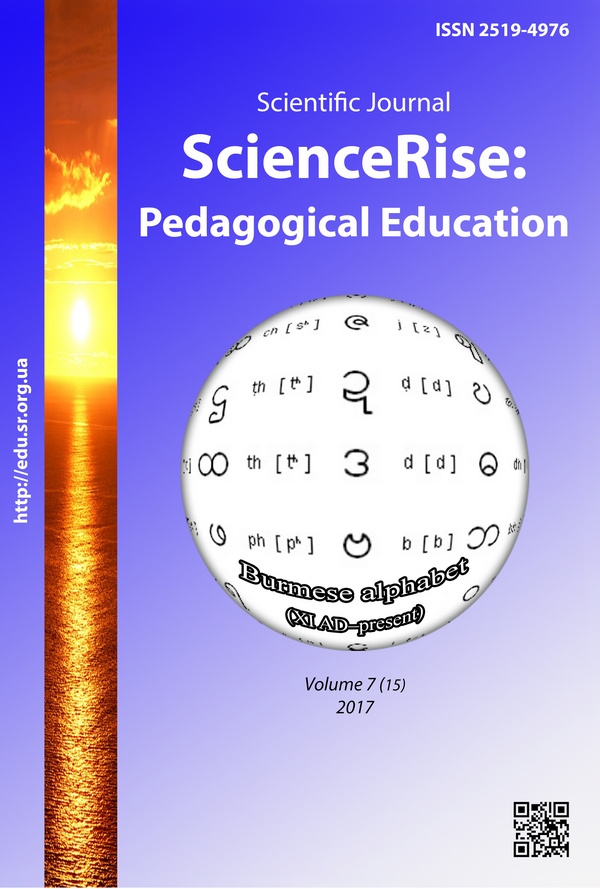Psychopedagogical support of the efficient leader of the XXI century: synergetic approach
DOI:
https://doi.org/10.15587/2519-4984.2017.107966Keywords:
psychopedagogical support, synergetic approach, interaction, self-organization, self-development, leader, leadership, practicumAbstract
The essence of the psychopedagogical support of an effective leader of XXI century on the background of the synergetic approach was studied in the paper. It was grounded, that the general scientific synergetic approach includes the whole totality of the universal processes of self-organization as the stages of the open system dynamics – appearance, changes, self-complication in the aspect of social regulation. It was proved, that the combination of formal and informal leadership, when an official supervisor is accepted by members of a group also as a leader, is an ideal variant of the management and functioning of an organization. It was concretized, that the psychopedagogical support of a leader is a special type of the help to a leader, used with the support on specific individual and group psychopedagogical methods and intended to help to solve problems of professional-personal harmonization or to prevent them, including the diagnostics, psychopedagogical consulting and development of personal-professional managerial competences using elements of modern psychotechniques: health preserving, couching, facilitation and so on. The main directions of the psychopedagogical support realization were determined: psychological diagnostics, psychological education, psychological consulting, developing learning course, psychological-pedagogical correction. The practical aspect of the work is explained on the example of introduction of the psychopedagogical practicum for local self-government leaders on the base of the synergetic approach that provides test and practical tasks realization for the diagnostics and personal-professional self-improvement, and also the use of earlier mastered knowledge, abilities and skills in the multi-channel interaction at training group activities. The psychopedagogical technology of practical group activities provides the activity in small groups, guaranteeing the synergetic effect. Each of these groups realizes the certain type of a practical work (differentiated study). There were noted the prospects of introducing the system of psychopedagogical support of effective leaders, based on the synergetic approach, conditioned by the fact that such system corresponds to the nature of “living organization” and reflects the constructive development in the logic of dynamic and little-predictable chaotic processes in the modern society
References
- Surtaev, P. B. (2006). Paradigmy pedagogicheskoy nauki i praktiki: aspekt sosushhestvovaniya. Omsk, 161.
- Laslo, E. (2003). Vek bifurkacii. Put, 7, 31–39.
- Budanov, V. G. (2007). Metodologiya sinergetiki v postneklassicheskoy nauke i v obrazovanii. Moscow: LKI, 232.
- Jeshbi, U. R.; Uspenskogo, V. A. (Ed.) (1996). Vvedenie v kibernetiku. Moscow: Izd-vo URSS, 432.
- Ashby, W. R. (1947). Principles of the Self-Organizing Dynamic System. The Journal of General Psychology, 37 (2), 125–128. doi: 10.1080/00221309.1947.9918144
- Haken, G. (1985). Sinergetika. Ierarhija v samoorganizuyushhihsya sistemah i ustroystvah. Moscow: Mir, 456.
- Ruzavin, G. (2005). Filosofija nauki. Moscow: Juniti, 400.
- Ershova-Babenko, I. V. (2005). Social'naya sreda v svete izmeneniy v nauke: konec ХХ – nachalo ХХІ st. Psihosinergetiskie strategii chelovecheskoy deyatel'nosti (konceptual'naya model'). Vinnitsa: Nova knyha, 360.
- Zyazyun, I. A. (2008). Konceptualni pidkhody do pedaghoghichnoi maysternosti – strateghichnoi dominanty svobody sub'ektiv uchinnya. Filosofiya pedaghoghichnoyi dii. Cherkasy: ChNU im. B. Khmelynycykogho, 608.
- Semenova, A. V. (2009). Paradyghmalyne modelyuvannya u profesiyniy pidghotovci maybutnikh uchyteliv. Odessa: Yurydychna literatura, 504.
- Osuhova, N. G. (2007). Psihologicheskaya pomoshh' v trudnyh i ekstremal'nyh situacіyah. Moscow: Akademiya, 288.
- Kazakova, E. I. (1998). Sistema kompleksnogo soprovozhdeniya rebenka: ot koncepcii k praktike. Saint Petersburg: Piter, 364.
- Bityanova, M. R. (2000). Organizaciya psihologicheskoy raboty v shkole. Moscow: Prosveshhenie, 321.
- Aleksandrovskaya, Ye. M. (2001). Psihologicheskoe soprovozhdenie detey mladshego shkol'nogo vozrasta. P. 2. Zhurnal prikladnoy psihologii, 1, 41–61.
- Shipicyna, L. M., Hil'ko, A. A., Gallyamova, Yu. S., Dem'yanchuk, R. V., Yakovleva, N. N.; Shipicyna, L. M. (Ed.) (2005). Kompleksnoe soprovozhdenie detey doshkol'nogo vozrasta. Saint Petersburg: Rech, 240.
- Litovchenko, O. S. (2014). Soderzhanie psihologo-pedagogicheskogo soprovozhdeniya professional'nogo zdorov'ya pedagoga. Molodoy uchenyi, 4, 695–697.
- Martin, C. Psychology (1997). New Jersey: Lawrence Erlbaum Associates, 200.
- Plato (2013). The Dialogues of Plato translated into English with Analyses and Introductions by B. Jowett, M. A. Vol. 3. Oxford: Oxford University Press.
- Bendas, T. V. (2009). Psihologija liderstva. Saint Petersburg: Piter, 448.
- Markwell, D. (2013). Instincts to Lead: On Leadership, Peace, and Education. Australia: Connor Court, 500.
- Lyubovinkina, E. (2017). Liderstvo. Mental Skills. Available at: http://www.mental-skills.ru/dict/liderstvo/
- Bird, С. (1940). Social Psychology. New York: Appleton-Century Company, 564.
- Sergheeva, L. M., Kondrateva, V. P., Khromey, M. Ya.; Sergheeva, L. M. (Ed.) (2015). Liderstvo. Ivano-Frankivsk: Lileya-NV, 296.
- Lebedev, O. E. (2004). Kompetentnostnyi podhod v obrazovanii. Shkol'nye tehnologii, 5, 3–12.
- Mitina, L. M. (2004). Psihologiya truda i professional'nogo razvitiya. Moscow: Akademiya, 320.
Downloads
Published
How to Cite
Issue
Section
License
Copyright (c) 2017 Alla Semenova

This work is licensed under a Creative Commons Attribution 4.0 International License.
Our journal abides by the Creative Commons CC BY copyright rights and permissions for open access journals.
Authors, who are published in this journal, agree to the following conditions:
1. The authors reserve the right to authorship of the work and pass the first publication right of this work to the journal under the terms of a Creative Commons CC BY, which allows others to freely distribute the published research with the obligatory reference to the authors of the original work and the first publication of the work in this journal.
2. The authors have the right to conclude separate supplement agreements that relate to non-exclusive work distribution in the form in which it has been published by the journal (for example, to upload the work to the online storage of the journal or publish it as part of a monograph), provided that the reference to the first publication of the work in this journal is included.








